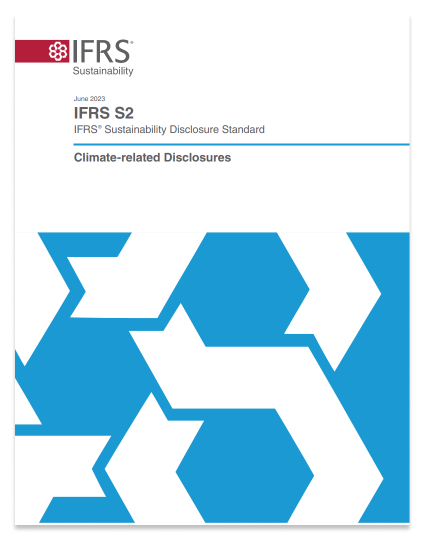Background: In 2015, the Financial Stability Board (FSB) created the Task Force on Climate-Related Financial Disclosures (TCFD) to improve reporting of climate-related financial information. In 2021, the International Financial Reporting Standards (IFRS) Foundation formed the International Sustainability Standards Board (ISSB). In 2023, the ISSB published their inaugural ISSB Standards—IFRS S1 and IFRS S2—which fully incorporated the recommendations of the TCFD, marking the cumulation of the work of the TCFD. Shortly afterwards, the FSB disbanded the TCFD and the IFRS Foundation took over monitoring companies’ climate-related disclosures.
What is IFRS S1 and IFRS S2?
IFRS S1 is the General Requirements for Disclosure of Sustainability-related Financial Information and IFRS S2 is Climate-related Disclosures. Released in June 2023, these standards fully incorporate the recommendations of the TCFD and are structured around four core elements:
- Governance
- Strategy
- Risk Management
- Metrics & Targets
The focus of this article is on IFRS S2.

IFRS S2: Climate-Related Disclosures
IFRS S2 is a new standard set by the ISSB, focusing on climate-related disclosures. It outlines requirements for companies to report on governance, strategy, risk management, and metrics/targets related to climate risks and opportunities.
Why is IFRS S2 important?
It enhances transparency and consistency in climate reporting, enabling stakeholders to make informed decisions about resource allocation and investment based on climate-related factors.
What’s new or different?
IFRS S2 marks a shift towards standardized climate reporting, incorporating TCFD recommendations. It mandates comprehensive disclosure of climate-related risks/opportunities, emphasizing scenario analysis and resilience testing.
Who is it for?
IFRS S2 applies to all entities disclosing financial information, ensuring that companies across industries provide consistent and relevant climate-related information to investors, regulators, and other stakeholders.
What is next?
Implementation of IFRS S2 begins on January 1, 2024. Companies need to prepare for compliance by aligning their reporting practices with the standard’s requirements and enhancing their climate risk management processes.
Preparing for disclosure
To effectively prepare for compliance, companies will require credible climate risk analysis, including an understanding of the Climate Value at Risk (CVaR) for real estate assets.
To learn more about how ClimateFirst can support your IFRS S2 disclosure requirements, connect here.

